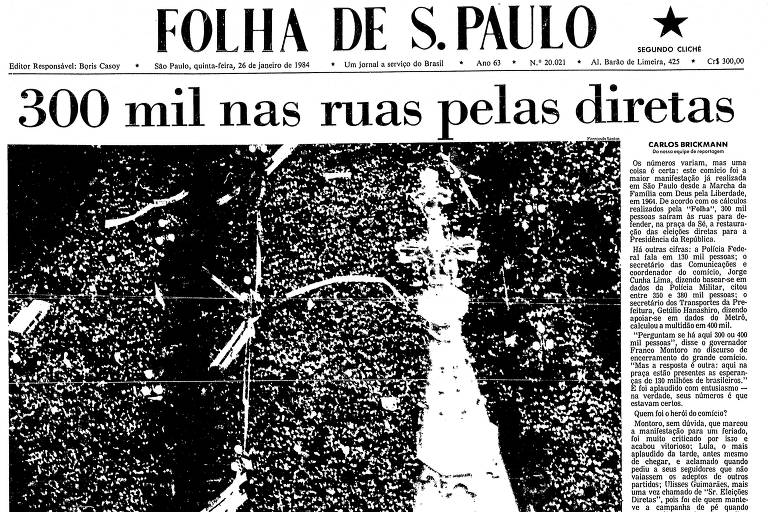Folha will launch Saturday (27) an advertising campaign in defense of democracy. The commercial will debut at the interval of Jornal Nacional, on TV Globo.
During the same weekend, Folha will publish the special project, "What Was the Dictatorship," which dissects the authoritarian period of 1964-85 and is aimed mainly at people who did not live it directly.
A Datafolha survey of the opinion of Brazilians about the dictatorship and their degree of knowledge about some of its most striking points will also be released.
According to the Brazilian Institute of Geography and Statistics (IBGE), 54.2% of the Brazilian population was born after 1985, when the military regime ended. Adding those who were children up to 10 years old on that date, the percentage rises to 69.4%.
In other words, 7 out of 10 Brazilians did not live under the dictatorship, or were too young to understand the moment.
In the same vein, a free online course of four classes will also debut on the 28th, each one hour long, promoted by Folha (registrations can be made here - https://oquefoiaditadura.folha.uol.com.br). The project will explain the various phases of the dictatorship, from the antecedents of the March 31, 1964 coup to the transition to democracy.
The purpose of the package is to show, especially to the youngest, the authoritarian period's reality.
"The institutional role of a newspaper like Folha is to show in an educational and unbiased way what happened so that it doesn't happen anymore. There is no solution outside of democracy. There is no path other than that of the Constitution", said Folha's Editorial Director, Sérgio Dávila.
The newspaper's campaign against the dictatorship is inspired by the mobilization of Diretas Já, in 1984, in which Folha created internally and played a prominent role. The Diretas Já movement pushed for direct elections in Brazil.
Thirty-six years ago, a yellow banner was added under the newspaper's headline, next to the phrase "Use yellow for Rights Now." The yellow banner will return with the words "#UseAmarelo pela Democracia," in print and digital versions. The commercial will also be shown on open and paid TV channels and social media.
Yellow was the color of the Diretas Já campaign. Although used with variations, mainly in the shirt of the Brazilian team, Jair Bolsonaro and his supporters appropriated the color. It has been rescued by pro-democracy groups that recently launched, such as Somos Juntos and We are 70 percent, a reference to the percentage indicated in Datafolha surveys of people who do not approve the current president's management.
The military dictatorship was marked by the absence of direct presidential elections, interference by the regime in the Legislative and Judiciary Powers, censorship, and violent repression of the opposition, with murders and torture as state policies.
"The purpose of the actions is to show this generation what that exceptional regime was, its horrors, systematic torture, the disappearance of political opponents, the impeachment of fundamental rights, such as that of direct voting," Dávila said. "Furthermore, to end the myth of the incorruptible and democratic regime."
In the economy, the dictatorship adopted a model that, if there were moments of euphoria with expressive growth rates, left the seed for hyperinflation, increased inequality, and external indebtedness.
It also favored corruption in large public works and generated scandals that were not made public due to the lack of transparency in the period and the persecution of the press.
This whole panorama will be the subject of an online course given by journalist and writer Oscar Pilagallo. In four classes, Pilagallo will talk about the setup of the coup, the authoritarian escalation, the hardening of the regime from Institutional Act No. 5 (1968), and the resumption of democracy (1985).
Registration for the free course can be made at oquefoiaditadura.folha.uol.com.br.
"People, especially younger people, tend to take for granted that democracy is something that has always been there. But they forget, or don't know, that it wasn't always like that", says Pilagallo, author of "The History of Brazil in the 20th Century" (Publifolha) and co-author of "The Coup of 64" (Três Estrelas), among other books.
At Folha, Pilagallo performed several functions, including that of Economics editor, in the 1990s.
According to the journalist, the discourse to justify the coup and the dictatorship's repression to avoid a greater evil, in this case, an alleged communist threat, has grown in recent years, propagated mainly by Jair Bolsonaro and his allies.
The president, who has a history of praising the country's military dictatorship, has already participated in protests of supporters who flaunted anti-democratic flags, such as a request for intervention by the Armed Forces and the closing of the Supreme Court. The Supreme Court is investigating who are the financiers of this type of demonstration.
Pilagallo says his goal is for the course to be analytical and balanced, faithfully portraying the various facets of the dictatorship.
"The challenge is great, precisely because of the polarization we are experiencing. Certainly, any more balanced view tends to be beaten on both sides," he said.
Translated by Kiratiana Freelon
